Key takeaways:
- Digital educational communities enhance learning through diverse perspectives and collaboration beyond geographical boundaries.
- Quality educational publishing fosters accountability, engagement, and provides vital resources for learners.
- Active participation and vulnerability in discussions contribute to deeper connections and a supportive learning environment.
- Challenges in digital education include the digital divide and information overload, which can impede engagement and motivation.
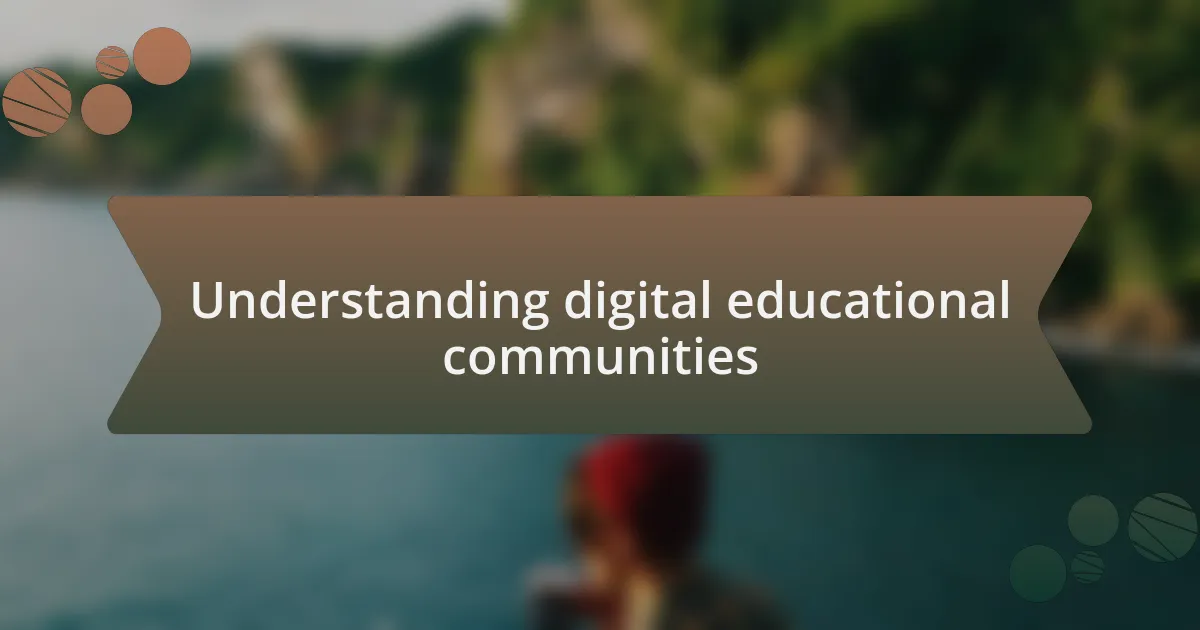
Understanding digital educational communities
Digital educational communities are vibrant spaces where learners and educators connect beyond traditional classrooms. I remember joining an online forum after a particularly challenging class. It was incredible to exchange ideas and gain fresh insights from peers who shared my struggles. Have you ever found clarity in a discussion that just clicked for you? That’s the power of these communities at work.
The rich diversity within these digital spaces often enhances the learning experience. For instance, when I participated in a global webinar, I was astonished by the different perspectives and teaching methods from around the world. It made me realize that learning doesn’t have a one-size-fits-all approach. How often do we forget that collaboration can break the barriers of geography and create a mosaic of knowledge?
Building trust and a sense of belonging in these communities is crucial. I recall how, in a small study group online, sharing our personal setbacks led to deeper connections and support. It’s fascinating to consider how vulnerability in a virtual setting can foster a strong network. Isn’t it interesting how these digital connections can feel as genuine as those formed in person?
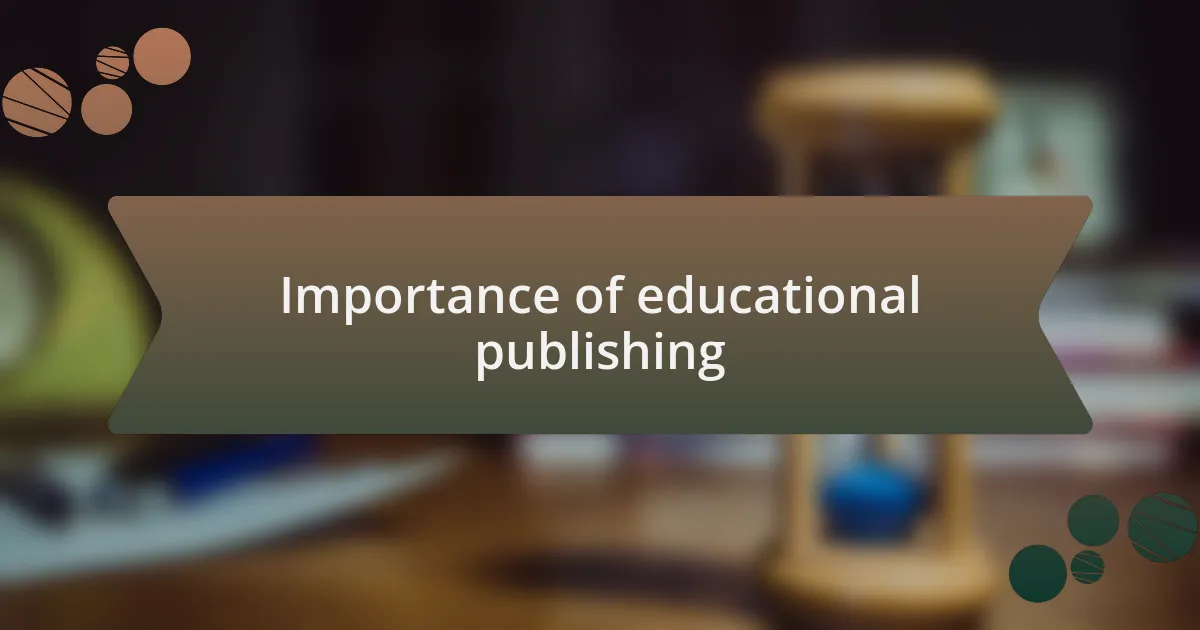
Importance of educational publishing
The role of educational publishing in shaping knowledge is profound. I’ve seen firsthand how well-curated educational materials can spark curiosity and drive engagement. It’s like having a roadmap in an unfamiliar city; without it, navigating the vast landscape of information can become overwhelming. Have you ever felt lost in a sea of data, only to stumble across a resource that made everything click?
Moreover, educational publishing fosters a sense of accountability among learners. I remember using high-quality textbooks for my studies, which not only provided reliable information but also encouraged me to stay committed to my goals. The structured learning experience they offered reminded me that education is not just a one-off event but a continuous journey. Isn’t it comforting to know that one well-crafted book or article can steer someone toward their ambitions?
Finally, the accessibility of educational publishing has revolutionized learning opportunities. I often reflect on how online resources—be it e-books or academic journals—have made it possible for individuals in remote areas to access quality content. It’s empowering to think about how this democratization of knowledge enables everyone, regardless of their background, to pursue their education. How many lives could be transformed by simply having the right information at the right time?
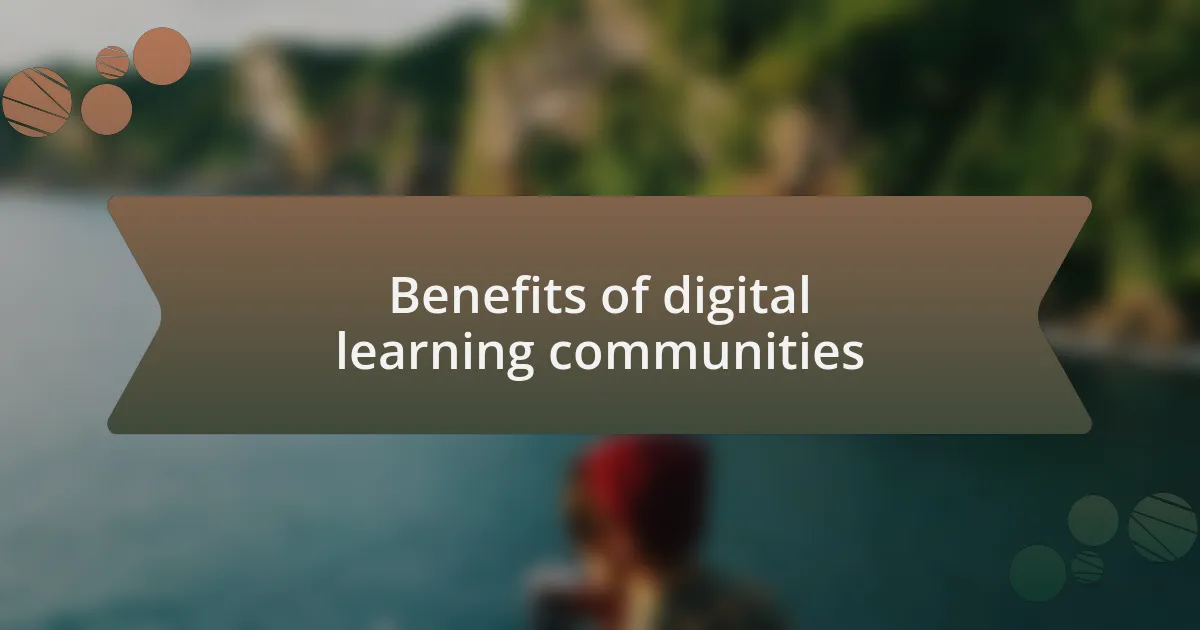
Benefits of digital learning communities
Digital learning communities provide a unique platform for collaboration that traditional classrooms often lack. I remember joining an online group dedicated to teaching methodologies and found it refreshing to exchange ideas with educators from various backgrounds. The collective knowledge within that community enriched my understanding and prompted me to rethink my own teaching practices. How often do we get to interact with such diverse perspectives in a physical setting?
Another significant benefit is the constant access to resources and support. When I faced challenges while designing a course, I turned to my digital community for advice. The immediate feedback and shared experiences made a daunting task feel manageable. Isn’t it reassuring to know that help is just a click away, especially when you’re navigating a particularly tricky educational endeavor?
Perhaps most importantly, these communities foster relationships that last beyond a single interaction. I’ve made connections with fellow educators that have led to collaborative projects and even friendships. It’s incredible how a shared passion can bring people together, transcending geographical boundaries. Have you ever built meaningful relationships through a shared interest? It’s a reminder that learning is not an isolated journey; it’s a collective experience that can thrive in the digital age.
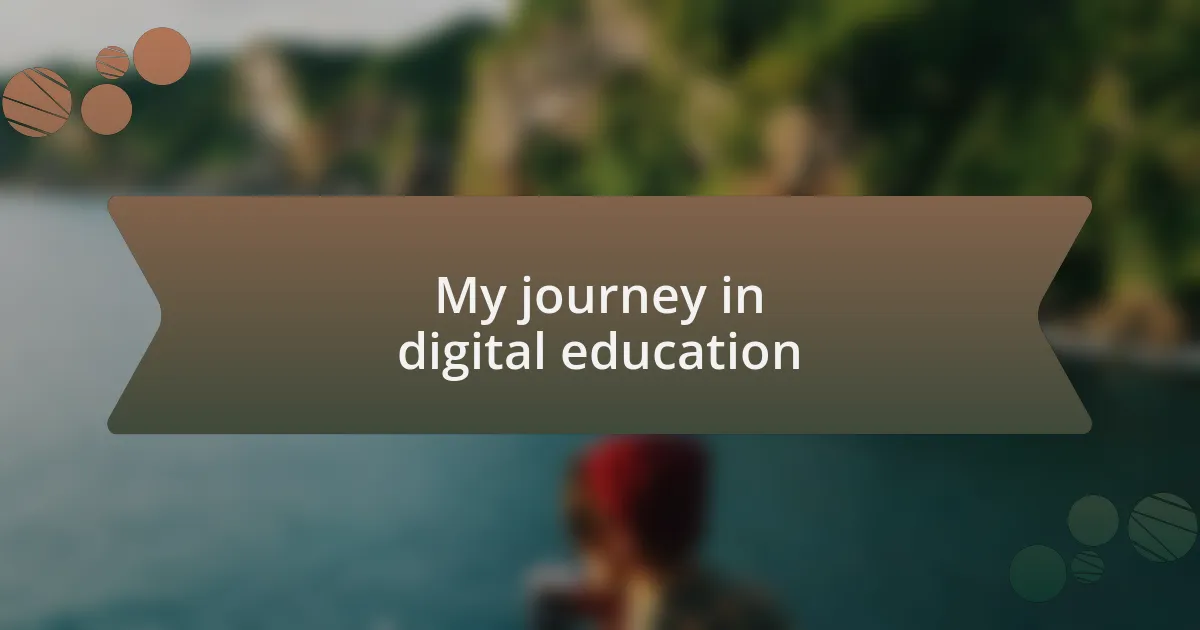
My journey in digital education
My journey in digital education began unexpectedly when I stumbled upon an online forum while searching for innovative teaching strategies. I vividly recall the excitement I felt as I engaged in discussions that challenged my thinking. It was as if I had unearthed a treasure trove of ideas that not only invigorated my teaching but also reignited my passion for learning. Have you ever experienced a moment where a simple conversation sparked a new direction for your own work?
Over time, I found myself becoming more comfortable sharing my own experiences and insights within these communities. I remember a time when I posted a lesson plan that I was particularly proud of; the positive feedback and constructive suggestions I received were incredibly validating. It dawned on me that contributing was just as fulfilling as learning, creating a symbiotic relationship with my peers. Isn’t it fascinating how the act of sharing can significantly enhance your learning experience?
As I continued to navigate through various digital experiences, I recognized the importance of mentorship within these communities. I have been fortunate to connect with seasoned educators who guided me through challenges, offering wisdom that only experience can impart. Reflecting on those interactions, I realize that these relationships have shaped not only my professional path but also my identity as an educator. How could I have imagined that my journey in digital education would lead to such profound personal growth?
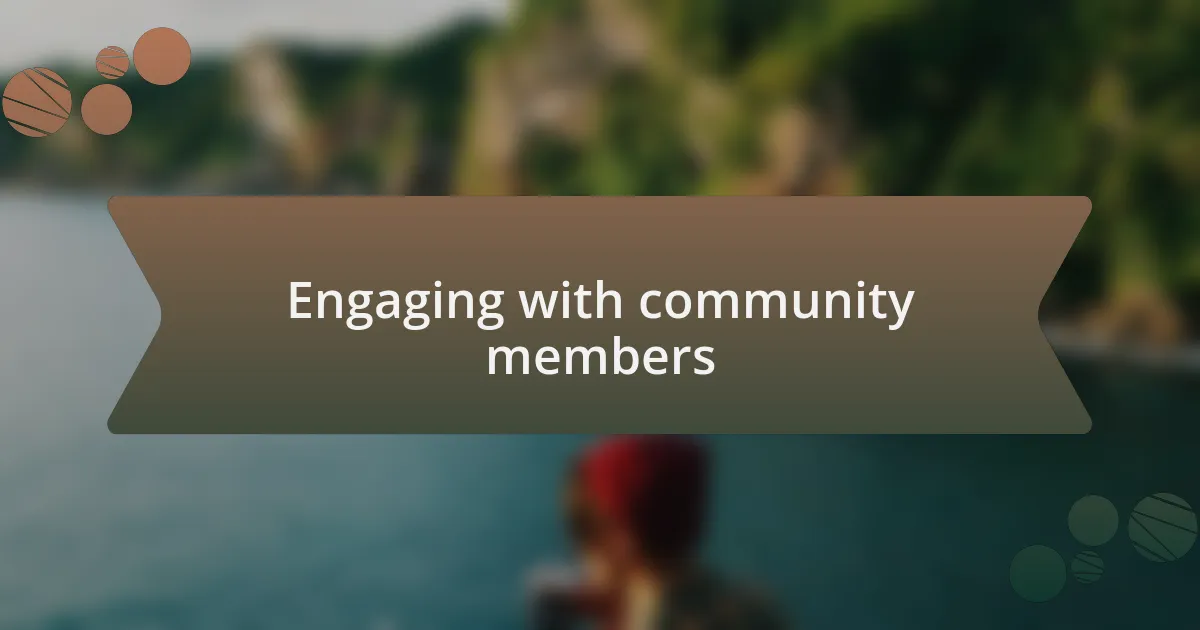
Engaging with community members
Engaging with community members is one of the most rewarding aspects of being part of a digital educational space. I remember joining a live webinar where participants shared their teaching challenges in real-time. The sense of camaraderie that emerged during our discussions made me feel like I was part of a larger family, all striving for better educational outcomes. Have you ever felt that sense of unity with a group of like-minded individuals?
As I began to interact more frequently, I learned the value of asking questions that sparked deeper conversation. By sharing not only my successes but also my failures, I created a safe environment for others to open up. I once shared a lesson that completely flopped, and to my surprise, many chimed in with their own stories of failure. This vulnerability broke down barriers and paved the way for meaningful dialogue about resilience in teaching—don’t you think sharing our missteps often leads to the most powerful learning experiences?
One particular instance stands out in my mind, where a message from a community member changed my perspective entirely. I had posted a question about integrating technology into my classroom, and the replies flooded in with an array of creative solutions. I vividly recall one educator sharing a strategy that seemed so simple yet transformative. Their willingness to engage not only enriched my approach but also reinforced my belief in the importance of collaboration. Isn’t it remarkable how a single interaction can motivate us to think outside the box?
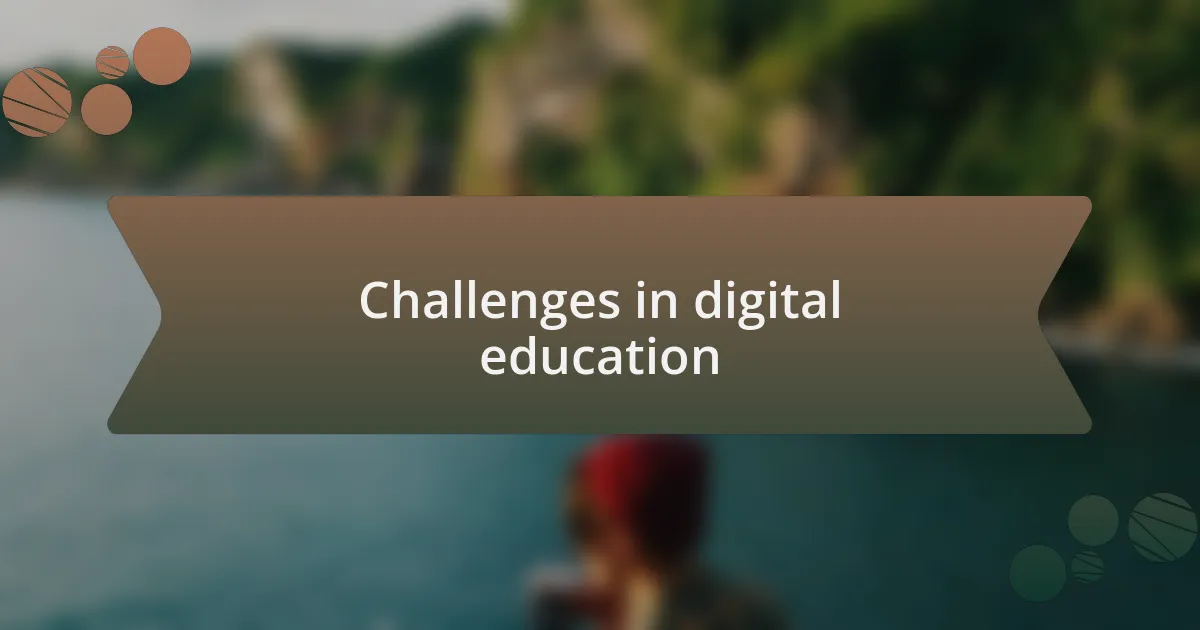
Challenges in digital education
Digital education comes with its share of challenges, and one significant hurdle I’ve encountered is the digital divide. While technology offers incredible opportunities for learning, not everyone has equal access to high-speed internet or devices. I once facilitated a workshop where half the participants struggled to connect due to spotty internet access. It was a stark reminder of how disparities can limit engagement and hinder the collaborative spirit we all strive for.
Another issue I’ve faced is the overwhelming amount of information available at our fingertips. On one hand, it’s fantastic to have so many resources, but it can also lead to decision fatigue. I remember spending hours sifting through articles, videos, and forums, only to feel more confused about the best approaches for my own teaching. How do we filter out the noise and stick to what truly benefits our learning community? It’s a question that often plagues educators.
Maintaining motivation and consistency in digital spaces is another tough nut to crack. There was a period when I joined multiple online courses but struggled to keep up with the pacing. I found myself withdrawing from discussions simply because I felt overwhelmed. Have you ever felt that pull of disengagement in the virtual world? It’s a common experience that challenges the vibrant interactions we hope to cultivate in these educational communities.
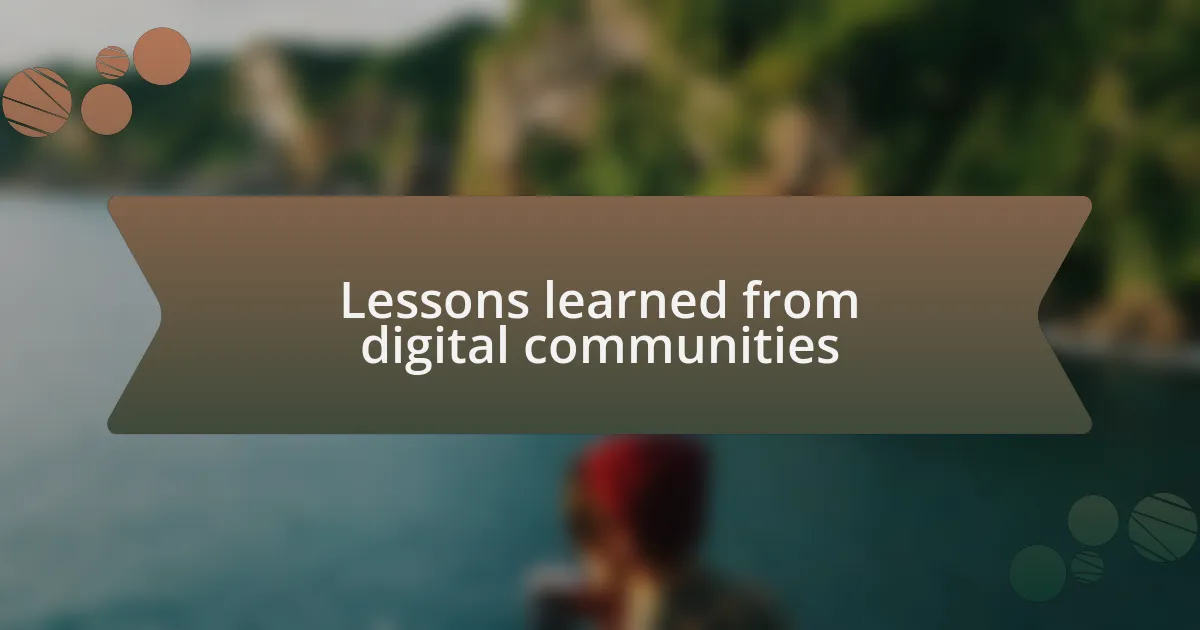
Lessons learned from digital communities
Digital educational communities have taught me the importance of active participation. I remember joining a forum dedicated to innovative teaching strategies, where sharing experiences transformed my perspective. Engaging in discussions opened my eyes to diverse viewpoints and practical solutions I wouldn’t have considered otherwise. Is it possible that we often underestimate the value of just sharing our voices in these spaces?
One striking lesson I’ve learned is the power of collaboration. During a group project on curriculum development, we faced a tight deadline. By pooling our strengths and brainstorming together, we created something much stronger than what I could have done alone. This experience reinforced my belief that collective wisdom can spark creativity and build lasting connections. Have you noticed that teamwork often ignites new ideas?
Finally, I’ve realized that accountability plays a crucial role in digital communities. In one online course, I partnered with a fellow educator to check in on our progress weekly. This simple act of sharing our goals kept me motivated and focused. Could it be that knowing someone is counting on us enhances our commitment? It certainly worked for me, and I’ve since incorporated similar strategies in various online settings.